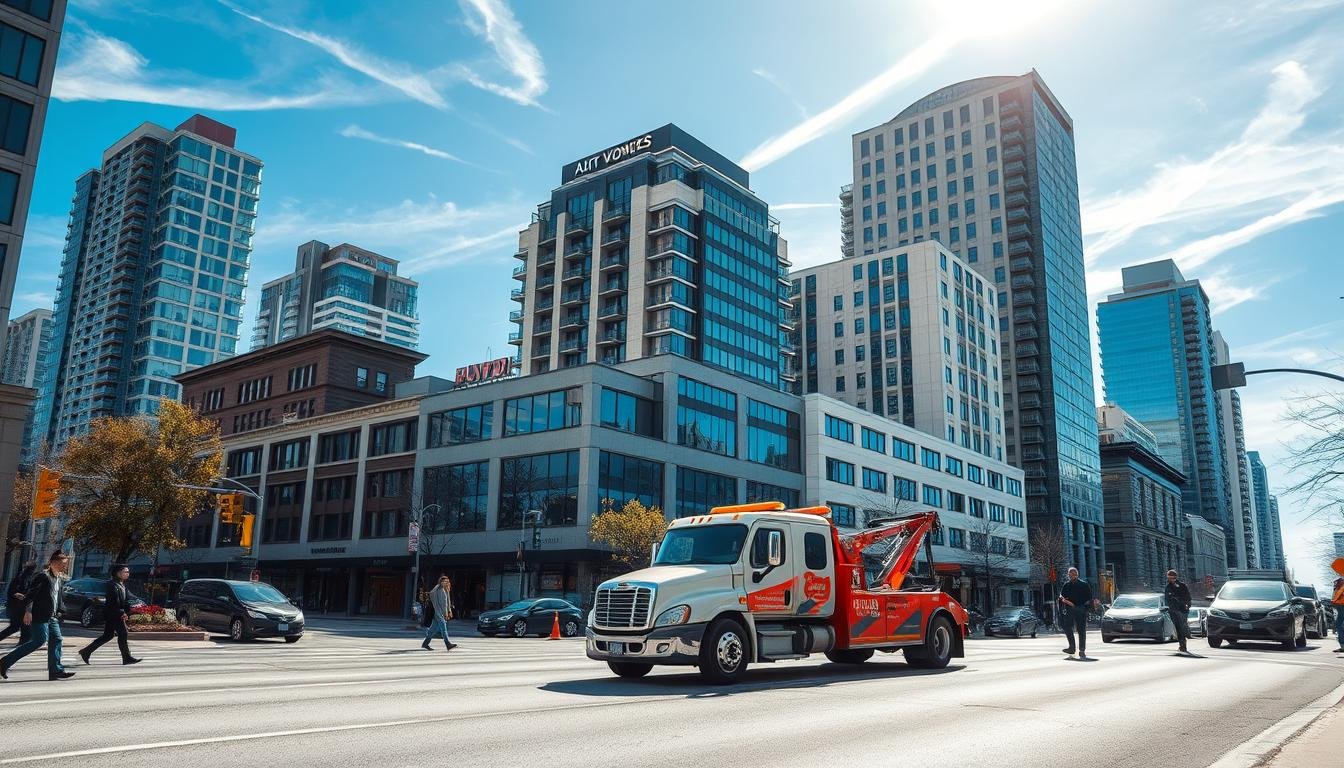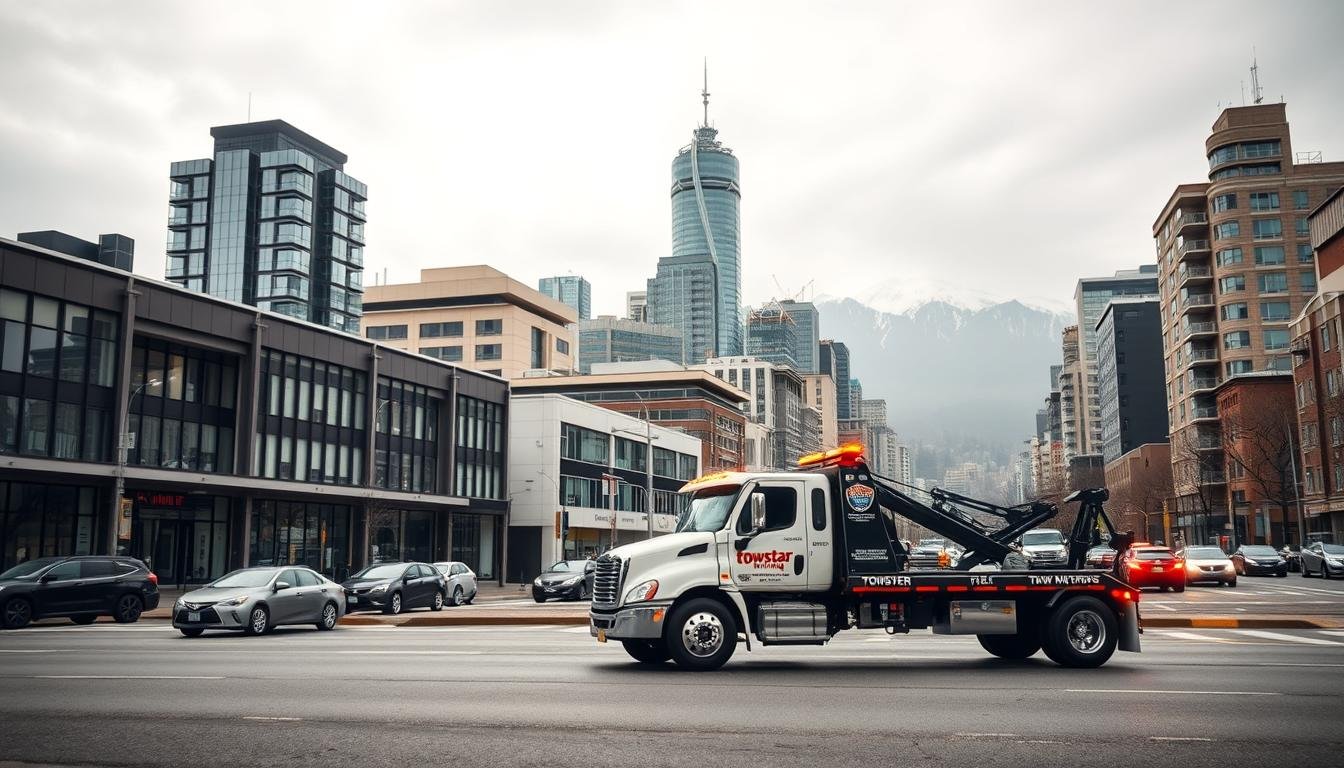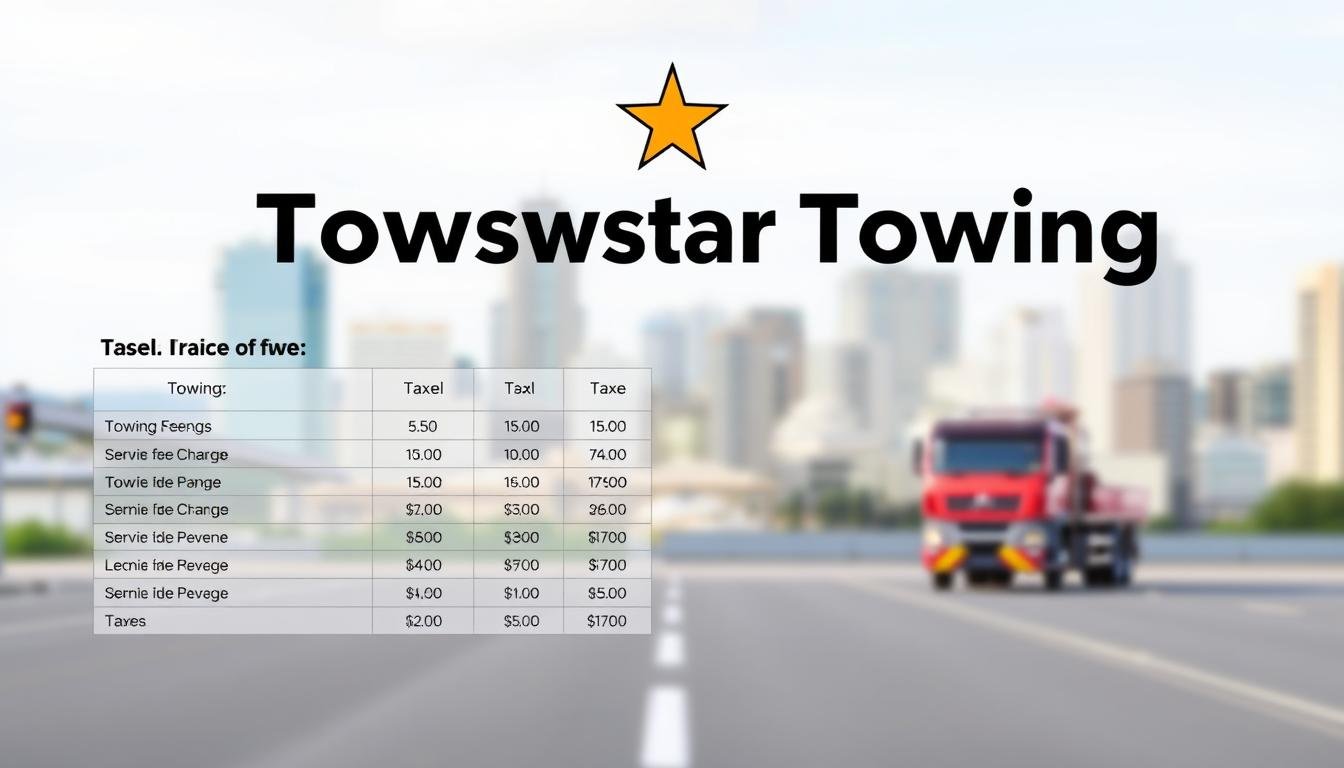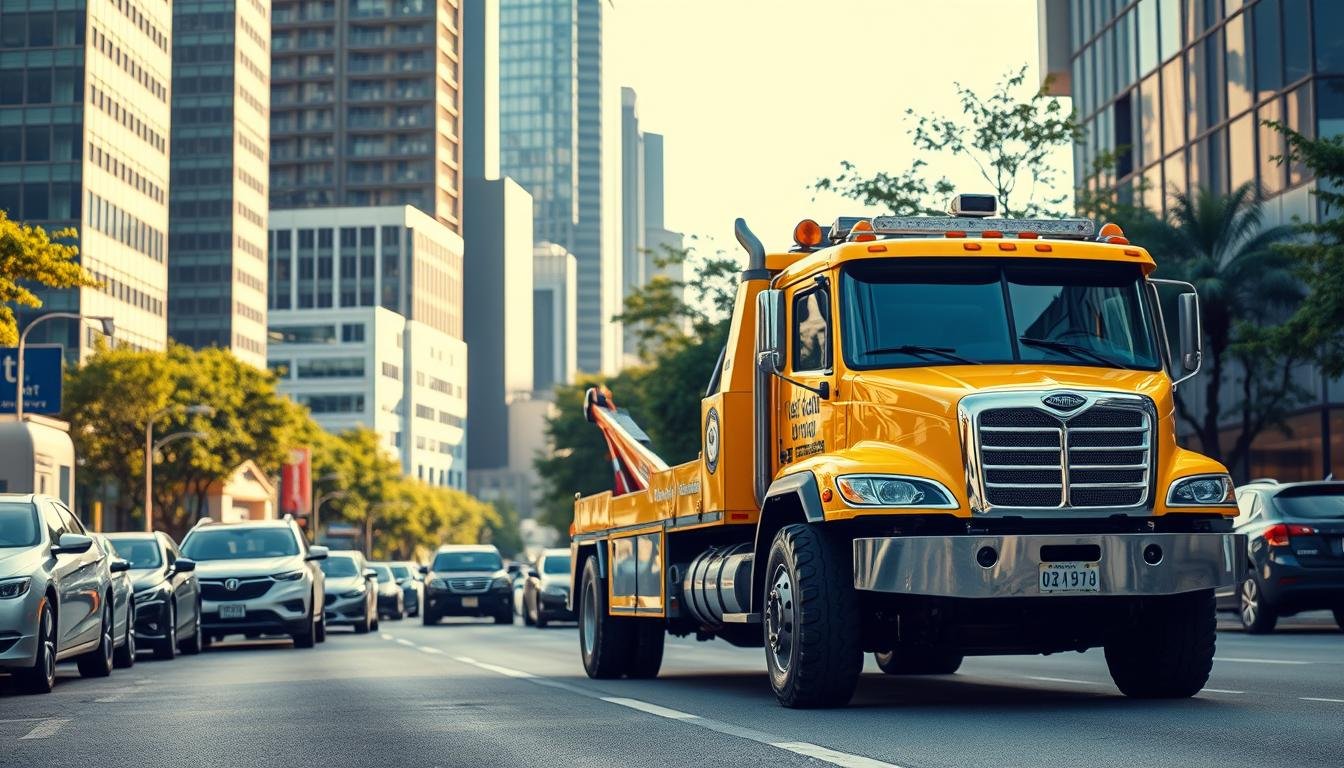Traveling across Canada in a recreational vehicle needs skill and care. It’s not just about moving a vehicle; it’s about getting it to its destination safely. Towstar excels in heavy-duty RV hauling through British Columbia’s tough terrains.
RV transport in Canada faces special challenges, like mountain roads and coastal paths. Your RV is a big investment, so it needs expert care when being moved. Experts know how to handle different RVs and offer custom solutions.
Planning your RV move can save you time, money, and stress. Towstar provides reliable and efficient RV transport services across Canada. With our professional RV hauling services in Canada, you can trust that your vehicle will be handled with the utmost care. Whether you’re relocating for the season or embarking on a grand adventure, we ensure a seamless transition for your RV. Our team is dedicated to providing top-notch customer service, making your experience as smooth as possible. In addition to our exceptional hauling services, we also offer a variety of towing service options near you to accommodate different needs and preferences. Our experienced team will work closely with you to create a customized plan that fits your schedule and budget. You can count on us for predictable timelines and safe handling, ensuring your RV reaches its new destination without any hassle.
Key Takeaways
- Professional RV transport requires specialized expertise
- Terrain diversity impacts transportation strategies
- Proper handling ensures vehicle safety during transit
- Canadian RV transport demands complete knowledge
- Specialized towing services protect your significant investment
Understanding RV Hauling Rates in Canada
Exploring motorhome towing prices can seem daunting. Your RV is a big investment. Knowing the costs of camper hauling services is key for those watching their budget in Canada.
Hauling rates vary widely. Several factors affect the final cost of moving your RV from one place to another.
What Influences RV Hauling Rates?
Several key elements determine motorhome towing prices:
- Vehicle size and weight
- Total transportation distance
- Route complexity
- Time of year
- Specific camper hauling services required
Average Rates by Province
RV transportation costs differ across Canadian provinces. In British Columbia, short trips cost between $90 to $150. Longer trips or extra services can raise these prices.
Seasonal Variations in Pricing
Peak travel seasons raise transportation costs. Summer months see more demand for RV transport, increasing prices. Off-peak seasons might offer better rates for camper hauling services.
Smart travelers plan ahead. They look for flexible schedules to lower transportation costs.
The Role of Towstar in RV Transport
Towstar is a top choice for moving your RV across Canada. They know how to handle the costs and rates of moving trailers and RVs. Your RV is more than a vehicle; it’s your home. Towstar treats it with the care and respect it deserves.
RV transport is complex, and Towstar has the expertise to handle it. They make sure your RV gets to its destination safely and on time.
Overview of Towstar’s Services
Towstar provides a variety of RV transport solutions. They cater to different customer needs:
- Long-distance RV relocation
- Careful handling of motorhomes and trailers
- Rapid response times
- Comprehensive insurance coverage
Benefits of Choosing Towstar
What makes Towstar stand out in the RV shipping market? It’s their focus on customer happiness and their attention to detail.
| Service Feature | Towstar Advantage |
|---|---|
| Estimated Arrival Time | 30 minutes maximum |
| Vehicle Protection | Comprehensive damage prevention |
| Transport Flexibility | Accommodates all RV sizes |
Customer Reviews and Testimonials
Canadian RV owners love Towstar. They make moving your RV a stress-free experience. Their professionalism and commitment to customer care have made them a top choice in the RV transport industry.
Factors That Affect Transportation Costs
Planning to move your RV across Canada? Knowing what affects rv relocation fees is key. Your total cost depends on several factors that can greatly change your budget.
RV transport costs aren’t just a simple price tag. Several important factors will decide your final fifth wheel transport costs:
Distance and Location Considerations
The distance to your destination is a big factor in pricing. Longer trips over tough terrains like mountains or remote areas can raise costs.
- Provincial border crossings may incur additional charges
- Remote locations require specialized hauling equipment
- Urban routes might be more cost-effective
Size and Weight of the RV
The size and weight of your RV affect the cost. Bigger fifth wheels and heavy RVs need more transport resources, raising costs.
- Compact trailers have lower transportation fees
- Large motorhomes require extended hauling services
- Weight affects fuel consumption and equipment needs
Additional Fees to Keep in Mind
There are extra charges you might face during your RV move. Knowing these can help you budget better.
- Fuel surcharges
- Special handling requirements
- Insurance coverage options
- Seasonal transportation adjustments
By understanding these factors, you can better plan and possibly lower your RV transport costs in Canada.
The Importance of Insurance in RV Hauling

Protecting your recreational vehicle during transport is more than just paying for hauling. Insurance is key to keeping your investment safe and giving you peace of mind with motorhome delivery services.
Knowing the right insurance can prevent big financial losses. Your RV is a big investment, and it needs the right protection while it’s being moved.
Types of Insurance Coverage
For RV transport, there are several insurance options to keep your vehicle safe:
- Liability Coverage: Protects against damages to other vehicles
- Comprehensive Coverage: Shields your RV from theft, vandalism, and environmental damage
- Cargo Insurance: Designed for vehicles in transit
Why Insurance Matters for RV Owners
Unexpected things can happen when moving your RV. Insurance helps protect you from risks like:
- Accidental damage during loading and unloading
- Collision risks during long-distance transport
- Potential loss or theft
Common Misconceptions about RV Insurance
Many RV owners get their insurance wrong. Here’s what you need to know:
| Misconception | Reality |
|---|---|
| Personal auto insurance covers RV transport | Most standard policies do not provide full coverage |
| All transport companies include insurance | More coverage is usually a good idea |
| Insurance is too expensive | It’s a small price compared to repair costs |
While hauling charges for travel trailers are clear, insurance is a vital extra layer of protection. Always talk to your insurance provider to know what’s covered for motorhome delivery services and transport risks.
Preparing Your RV for Transport
Getting your RV ready for hauling is key to a smooth journey in Canada. Whether you’re using camper hauling services or planning RV transport, proper preparation is essential. It helps protect your valuable investment during transit.
Before your RV travels with professional rv hauling rates canada providers, take important steps. These steps ensure a safe and efficient transport. Research and compare different providers to find competitive rv hauling rates in Canada, as this can significantly impact your overall travel budget. Additionally, make sure to prepare your RV by removing any loose items and securing all doors and compartments to prevent damage during transit. By taking these precautions, you can enjoy peace of mind knowing that your RV is in good hands. Furthermore, it’s wise to inquire about insurance options offered by the rv hauling rates in Canada providers you consider. This can provide additional protection against unforeseen circumstances during transport. Finally, communicating any specific requirements or concerns to the hauling company can further ensure a smooth and reliable experience for your RV journey. Additionally, if you are considering pre-owned options, it’s beneficial to look into used rv hauling rates in Canada, as these can differ from typical rates and may offer cost-saving opportunities. Take the time to read reviews and feedback from previous customers to gauge the reliability of the service providers you are interested in. Ultimately, thorough preparation and informed choices will contribute to a stress-free RV transportation experience.
Essential Pre-Haul Checklist
- Secure all interior items to prevent shifting during transport
- Check tire pressure and condition
- Disconnect and secure all external attachments
- Empty water tanks and propane systems
- Remove or lock all loose external components
Necessary Documentation
Preparing the right paperwork makes your camper hauling services experience smoother. Gather these critical documents:
- Vehicle registration
- Insurance certificates
- Ownership proof
- Transport authorization forms
- Detailed RV condition report
Safety Precautions
Your RV’s safety during transport depends on careful preparation. Take time to photograph your RV’s current condition, noting any existing damages. Ensure all personal items are removed or securely fastened. Disconnect batteries and secure any possible leak points to prevent unexpected issues during transportation.
By following these guidelines, you’ll have a stress-free RV transport experience across Canada.
Comparing RV Hauling Companies
Choosing the right RV transport service in Canada is key. Not all companies are the same. Knowing how to compare them can save you time, money, and stress.
When looking at recreational vehicle shipping rates, focus on important metrics. These metrics help find top RV transport providers in Canada.
Key Metrics for Comparison
- Licensing and Certifications
- Insurance Coverage
- Equipment Quality
- Price Transparency
- Geographic Coverage
Why Experience Matters
Experience is more than just a number. It’s a sign of reliability. Seasoned RV transport experts know how to handle big vehicles in Canada.
| Experience Level | Typical Service Quality | Risk Factor |
|---|---|---|
| 0-2 Years | Basic | High |
| 3-5 Years | Good | Medium |
| 5+ Years | Excellent | Low |
Evaluating Customer Support
Your ideal RV transport provider should have great customer support. Look for companies with:
- 24/7 communication channels
- Clear pricing estimates
- Detailed tracking options
- Prompt problem resolution
By looking at these factors, you’ll find a service that fits your needs. It will give you peace of mind during transport.
The Process of Booking RV Transport
Booking RV transport might seem complicated, but it can be smooth with the right steps. Knowing about motorhome towing prices and rv relocation fees is key for planning.
To start with RV transport, you need to prepare well and know the booking steps. Our guide will help you through it all for a stress-free experience.
Steps to Schedule a Transport
- Contact the RV transport service directly
- Request an initial quote for motorhome towing prices
- Provide detailed vehicle specifications
- Select preferred transport dates
- Confirm booking and payment details
What Information Do You Need?
When booking RV transport, have this info ready:
- RV make, model, and year
- Current vehicle dimensions
- Empty and loaded weight
- Pickup and delivery locations
- Preferred transport dates
How to Prepare for Pickup
Preparing your RV for transport can save on costs and ensure a smooth trip. Clean it, remove loose items, and take photos of its current state.
| Preparation Step | Details |
|---|---|
| Vehicle Inspection | Check tire pressure, secure loose components |
| Documentation | Gather registration, insurance, and ownership papers |
| Personal Items | Remove valuables and non-secured items |
By following these steps, you’ll be ready for a hassle-free RV transport. Make sure to communicate well with your transport service and ask about any unclear costs.
Understanding Long-Distance RV Hauls

Going on a long RV trip across Canada is exciting but complex. Whether you’re moving your RV from British Columbia to the maritime provinces or through the prairies, knowing how to haul it long distance is key. This knowledge helps make your journey smooth.
RV hauling costs in Canada change a lot based on distance and transport needs. Fifth wheel transport costs are affected by several important factors. Every RV owner should know these before planning their move.
Advantages of Long-Distance Hauling
- Flexibility to relocate your RV across provinces
- Professional handling reduces wear and tear on your vehicle
- Saves time and reduces personal driving stress
- Access to specialized transport equipment
Challenges and Solutions
Long-distance RV transport has its own set of challenges. Weather, road conditions, and rules between provinces can affect your trip. Professional carriers help by:
- Using climate-controlled trailers
- Getting the right permits
- Having full insurance
- Using GPS for tracking
Tips for Finding the Right Carrier
When picking a long-distance RV transport service, look at these important factors. They help ensure a smooth trip:
- Check if the carrier has experience with long hauls
- Make sure they have full insurance
- Ask for detailed quotes for fifth wheel transport
- Read what other customers say
To understand RV hauling costs in Canada, do your homework and plan well. Choosing a trusted carrier and knowing the challenges ahead can make your long-distance RV trip stress-free. Researching different carriers will also help you compare rv hauling rates in Canada, ensuring you get the best deal for your budget. Additionally, consider the time of year for your trip, as seasonal demand can significantly affect the costs involved. By planning ahead and staying informed, you’ll be better equipped to navigate the RV hauling process smoothly. Additionally, be mindful of any extra services that may be included in your quote, such as insurance or specialized equipment, as these can influence the overall rv hauling rates in Canada. It’s also beneficial to read customer reviews and testimonials to gauge the reliability of potential carriers, which can provide further insight into the quality of service you can expect. Taking these factors into account will help you make a well-informed decision, ultimately leading to a more enjoyable RV journey.
Eco-Friendly RV Transport Options
Green transportation is changing the RV hauling industry. More people care about the environment, so trailer moving costs now include eco-friendly options. Eco-friendly RV transport is not just a trend; it’s essential for those who care about the planet.
Now, travel trailer hauling charges include green strategies. These strategies help reduce environmental harm while keeping service efficient. Sustainable practices are changing how RVs are moved across Canada.
Sustainable Practices in RV Hauling
- Utilizing fuel-efficient vehicles
- Implementing route optimization software
- Reducing carbon emissions through strategic planning
- Investing in hybrid and electric towing vehicles
Companies Leading the Way
Leading transportation companies are setting new standards for eco-friendly RV moving. By investing in green technologies, they show that being green and excellent service can go hand in hand.
Benefits of Choosing Eco-Friendly Transport
| Benefit Category | Environmental Impact | Cost Considerations |
|---|---|---|
| Carbon Reduction | Decreased greenhouse gas emissions | Potential long-term savings |
| Energy Efficiency | Lower fuel consumption | Reduced operational expenses |
| Technological Innovation | Supporting clean energy development | Potential tax incentives |
Choosing eco-friendly RV transport means more than just moving a vehicle. It supports a sustainable future for Canadian transport. Your choice helps reduce environmental harm and might even save on trailer moving costs.
The Impact of Fuel Prices on Hauling Rates
Fuel prices are key in setting rv hauling rates in Canada. If you’re looking for motorhome delivery services, knowing how fuel costs affect prices is important. It helps you make better choices.
Current Fuel Trends Across Canadian Provinces
Fuel prices change a lot in different Canadian provinces. Western provinces like Alberta and British Columbia usually have higher fuel costs. This affects rv hauling rates, so it’s important to keep up with market trends.
How Fuel Prices Affect Overall Transport Costs
Fuel costs can be a big part of the price for motorhome delivery services. When diesel and gasoline prices go up, transport companies raise their rates. This means you might pay more when fuel prices are high.
Smart Tips for Reducing Transport Costs
- Book during off-peak seasons for potentially lower rv hauling rates
- Choose consolidated transport options to share fuel expenses
- Plan your route strategically to minimize distance traveled
- Consider flexible pickup and delivery dates
Knowing about fuel-related factors helps you make better choices for your RV transport. You might even save money on your next move.
Customer Success Stories with Towstar
Real stories from customers show the best side of rv transport canada. Towstar is known for great rates and service that goes beyond just moving vehicles.
Our customers have shared amazing journeys. They talk about how Towstar moved everything from small travel trailers to big motorhomes. They did it all over tough Canadian terrains.
Case Studies of Successful Hauls
- Coastal British Columbia Mountain Route: A 38-foot motorhome safely transported through treacherous mountain passes
- Prairie Crossing: Delicate vintage RV moved 1,200 kilometers without a single scratch
- Remote Northern Ontario Delivery: Specialized equipment used to reach challenging wilderness locations
Customer Feedback Insights
People love Towstar’s professional way of moving RVs. Surveys show:
- 90% say moving with Towstar was stress-free
- 95% like how clear we are about everything
- 98% say they’d tell others to use Towstar
Enhancing Towstar’s Reputation
What makes Towstar special is our care. We see an RV as more than a vehicle—it’s a home and a place for memories. Every successful move shows we’re all about top service and making customers happy.
Future Trends in RV Transport in Canada
The RV hauling scene in Canada is changing fast. New tech is making a big difference in camper hauling services. Things like tracking systems and smart transport tech are changing how RV owners move their vehicles across Canada.
There’s a big move towards greener and more efficient transport methods. Electric and hybrid vehicles are getting more popular, which could lower costs for RV owners. Also, online booking is making it easier to find and book RV hauling services.
Experts say the next five years will see huge changes in RV transport. Things like automated routes, real-time tracking, and better logistics software will change the game. These tech updates will make moving RVs safer, more efficient, and maybe cheaper for RV fans in Canada.
People in the RV transport business think these new techs will lead to better prices. Customers will get more accurate quotes, better communication, and higher service quality. The future of RV transport in Canada is looking up, thanks to tech and innovation.
FAQ
How much does it cost to transport an RV across Canada?
RV transport costs vary based on several factors. These include the distance, RV size, time of year, and route. Prices range from
FAQ
How much does it cost to transport an RV across Canada?
RV transport costs vary based on several factors. These include the distance, RV size, time of year, and route. Prices range from $1.50 to $3.50 per kilometer. Oversized vehicles or tough routes may add extra fees.
A cross-country trip could cost between $3,000 and $10,000. It’s wise to get a detailed quote for your specific needs.
What preparation do I need to do before RV transport?
Secure all loose items in your RV. Check tire pressure and empty water tanks. Disconnect batteries and lock all external compartments.
You’ll need to provide vehicle registration, insurance details, and a condition report. Take photos of your RV before transport. Remove personal valuables for a safe journey.
How long does RV transport typically take?
Transport times vary by distance and route. Local moves take 1-2 days. Cross-provincial trips can take 3-7 days.
Long-distance hauls across Canada might take 10-14 days. Weather, road conditions, and the hauler’s schedule affect this.
Is insurance necessary for RV transport?
Yes, insurance is essential for RV transport. Most haulers have their own insurance. But, you should check the coverage details.
Consider extra coverage for damage during transport. Always ask for insurance proof and understand what’s covered.
Can I pack items inside my RV during transport?
Most companies advise against packing inside your RV. If you must pack, items should be lightweight and securely fastened. Heavy or loose items can cause damage.
It’s best to remove most personal belongings. Ensure all items inside are securely fastened to prevent damage.
What’s the best time of year to transport an RV in Canada?
Late spring to early fall is the best time for RV transport in Canada. Summer has reliable weather but is more expensive. Spring and early fall offer good rates and road conditions.
Winter transport is challenging due to snow, ice, and road restrictions.
How far in advance should I book RV transport?
Book RV transport 4-6 weeks in advance for the best planning. This ensures your preferred dates and rates. Booking early is key during peak seasons.
What documents do I need for RV transport?
You’ll need vehicle registration, insurance proof, a valid driver’s license, and a condition report. For interprovincial transport, you might need weight certificates or special permits.
Always check with your transport provider for specific documentation needs.
.50 to .50 per kilometer. Oversized vehicles or tough routes may add extra fees.
A cross-country trip could cost between ,000 and ,000. It’s wise to get a detailed quote for your specific needs.
What preparation do I need to do before RV transport?
Secure all loose items in your RV. Check tire pressure and empty water tanks. Disconnect batteries and lock all external compartments.
You’ll need to provide vehicle registration, insurance details, and a condition report. Take photos of your RV before transport. Remove personal valuables for a safe journey.
How long does RV transport typically take?
Transport times vary by distance and route. Local moves take 1-2 days. Cross-provincial trips can take 3-7 days.
Long-distance hauls across Canada might take 10-14 days. Weather, road conditions, and the hauler’s schedule affect this.
Is insurance necessary for RV transport?
Yes, insurance is essential for RV transport. Most haulers have their own insurance. But, you should check the coverage details.
Consider extra coverage for damage during transport. Always ask for insurance proof and understand what’s covered.
Can I pack items inside my RV during transport?
Most companies advise against packing inside your RV. If you must pack, items should be lightweight and securely fastened. Heavy or loose items can cause damage.
It’s best to remove most personal belongings. Ensure all items inside are securely fastened to prevent damage.
What’s the best time of year to transport an RV in Canada?
Late spring to early fall is the best time for RV transport in Canada. Summer has reliable weather but is more expensive. Spring and early fall offer good rates and road conditions.
Winter transport is challenging due to snow, ice, and road restrictions.
How far in advance should I book RV transport?
Book RV transport 4-6 weeks in advance for the best planning. This ensures your preferred dates and rates. Booking early is key during peak seasons.
What documents do I need for RV transport?
You’ll need vehicle registration, insurance proof, a valid driver’s license, and a condition report. For interprovincial transport, you might need weight certificates or special permits.
Always check with your transport provider for specific documentation needs.












